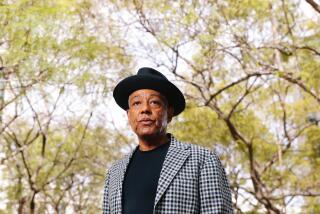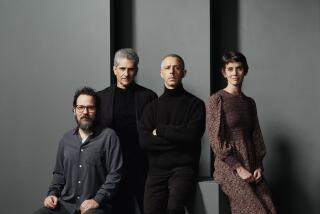‘General’ Looks for Lessons in Noriega’s Misdeeds
- Share via
It is now officially time to reevaluate Manuel Noriega. The scary, drug-running former dictator of Panama has just published a tell-little memoir this month, written from his Miami prison cell. In Los Angeles, two new plays about Gen. Noriega have opened in the span of one month--and both approach him with some sympathy and use him as a symbol of our own country’s moral vacuum.
First, Murray Mednick gave us a flat, short play called “Dictator” at the Theatre of NOTE, and now we have another problematic entry, “The General and the Archbishop.” The play is by Donald Freed, the man who (along with co-writer Arnold M. Stone) gave us “Secret Honor.” Just as “Secret Honor” depicted a ravaged Richard Nixon during a dark night of the soul, “The General” depicts Noriega at a pivotal moment in history, seeking sanctuary at the Papal Embassy during the 1989 American invasion of Panama. The play is at the Victory Theatre in Burbank.
Under the direction of Maria Gobetti, Matt Gottlieb offers a blustery and charismatic Noriega, a man who strides around the archbishop’s quarters drinking his own urine from a glass. He brags, blames and confesses, asking the archbishop to decide whether he is a saint or a devil. Or course, we are the ones who are supposed to decide. Freed spells out for us, with little dramatic tension, how he sees it.
*
The archbishop is played with a complex blend of piety and guilt by Max Wright, who looks disconcertingly like the husband in Van Eyck’s “Arnolfini Wedding Portrait.” At first we can’t tell whether the archbishop wants to help or trap the general, and that question provides the play with a little bit of suspense.
This is a red herring, however, for this play is not about how and when Noriega gets caught by the Americans, but about the very nature of crime in a morally corrupt universe. U.S. complicity in Noriega’s career is implied from the play’s opening moments--in which we hear George Bush denounce the general while nervously mangling his own sentences. In one energetic but somehow unsatisfying diatribe, Noriega crows that drug money fuels every segment of the international economy, including the Catholic Church. “No more drugs, no more God,” he says, assertively.
It’s never clear why, but the archbishop focuses on the murder of Hugo Spadafora, a doctor who publicly denounced Noriega, as the main crime for which Noriega needs to confess. When Freed’s Noriega tells the story of Spadafora’s torture at the hands of his own death squad, he seems to feel bad about it. But why, and how can we feel sorry for him?
This is a play that perhaps should have been an essay. In the wake of stories alleging CIA involvement in drug-running in the streets of Los Angeles, Noriega has become the poster boy for our own self-hatred. But we have yet to see a compelling play about him.
* “The General and the Archbishop,” Victory Theatre, 3326 W. Victory Blvd., Burbank, Thursday-Saturday, 8 p.m.; Sunday, 7 p.m. Ends June 8. $18-$20. (818) 841-5421. Running time: 1 hour,40 minutes.
More to Read
The biggest entertainment stories
Get our big stories about Hollywood, film, television, music, arts, culture and more right in your inbox as soon as they publish.
You may occasionally receive promotional content from the Los Angeles Times.










